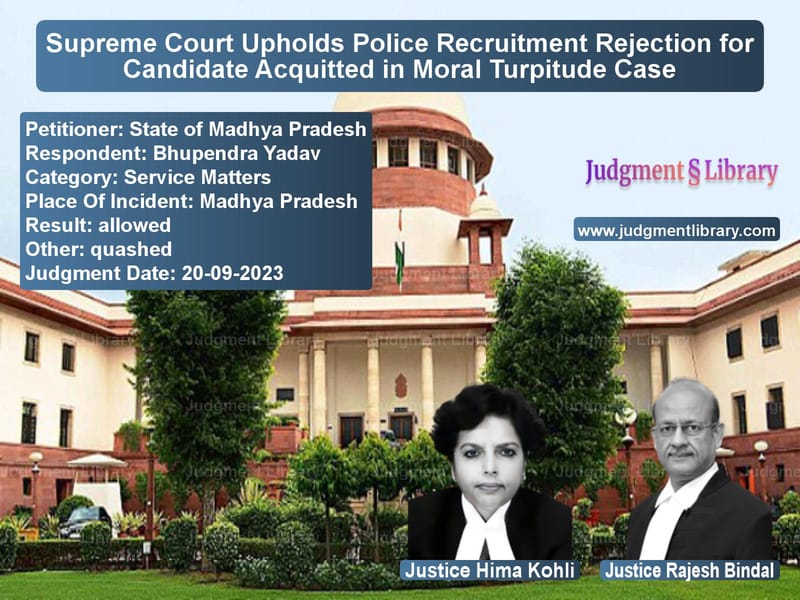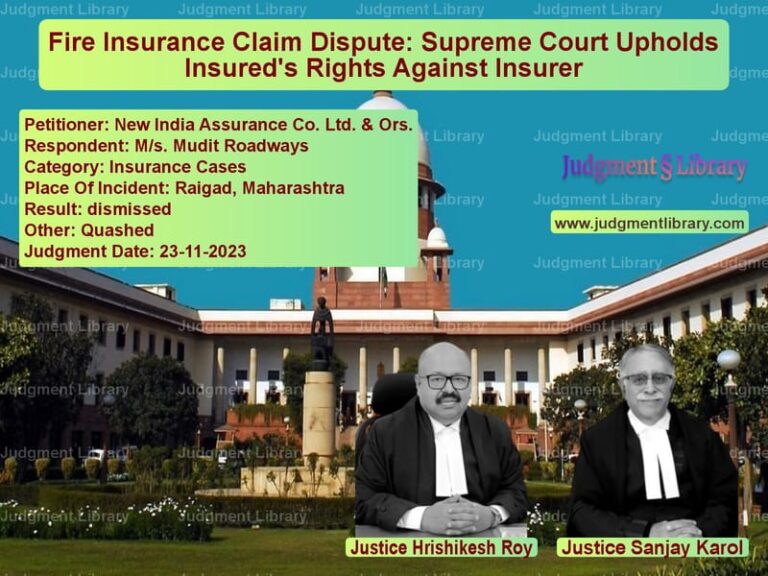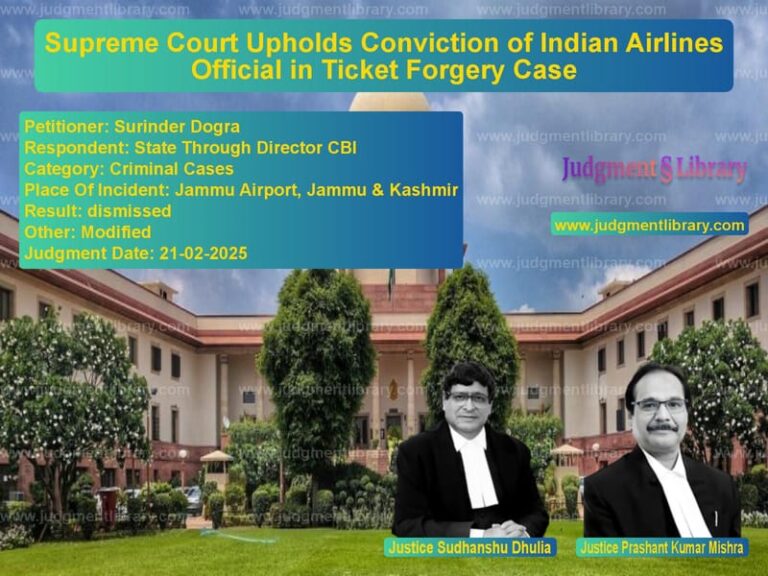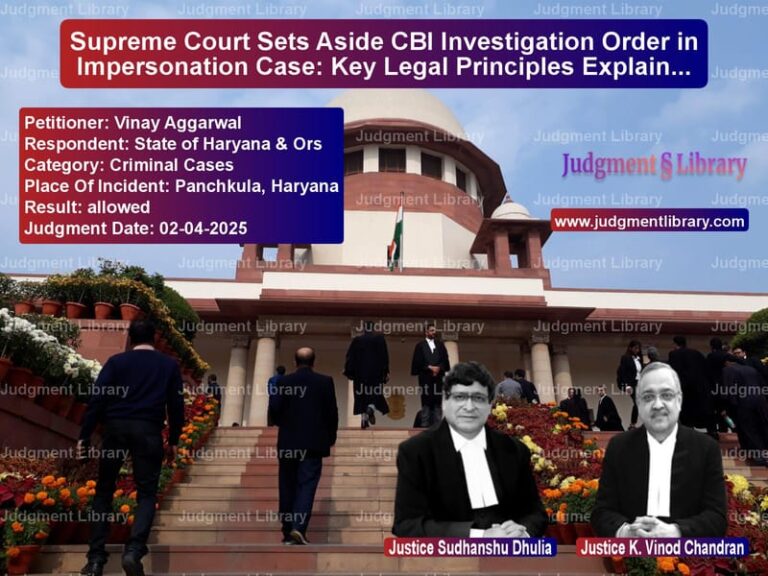Supreme Court Upholds Police Recruitment Rejection for Candidate Acquitted in Moral Turpitude Case
The Supreme Court of India has ruled in favor of the State of Madhya Pradesh, upholding the rejection of Bhupendra Yadav for the post of Constable despite his acquittal in a criminal case. The Court emphasized that individuals seeking law enforcement positions must meet higher moral standards and that an acquittal does not automatically ensure suitability for such roles.
Background of the Case
The case pertains to the recruitment of Bhupendra Yadav as a constable in the Madhya Pradesh Police. In 2015, Yadav was charged under Sections 341, 354(D) of the IPC and Section 11(D)/12 of the POCSO Act for allegedly harassing a minor girl. However, during the trial, the complainant and witnesses turned hostile, leading to his acquittal by the Additional Sessions Judge, Ashok Nagar.
Despite his acquittal, the Superintendent of Police, Ujjain, declared Yadav unfit for government service in 2017, citing concerns of moral turpitude. Yadav challenged this decision in the Madhya Pradesh High Court.
High Court’s Decision
The Single Judge of the Madhya Pradesh High Court dismissed Yadav’s petition, ruling that his case involved moral turpitude and that law enforcement agencies require candidates of impeccable character. However, the Division Bench overturned this ruling, stating that since Yadav had truthfully disclosed his past case and there were no other charges against him, he should be reconsidered for the position.
Key Issues Before the Supreme Court
The Supreme Court examined the following issues:
- Can a candidate be denied police service despite being acquitted in a criminal case?
- Does a truthful disclosure of past criminal charges entitle a candidate to government service?
- Should an employer have discretion in rejecting candidates based on their antecedents?
- Is moral turpitude a valid criterion for disqualification despite legal acquittal?
Petitioner’s Arguments (State of Madhya Pradesh)
The State of Madhya Pradesh, represented by Bharat Singh, contended:
- Police service requires individuals of the highest moral integrity, and even an acquitted person may be unsuitable.
- The charges against Yadav, though dismissed, involved harassment of a minor, which falls under moral turpitude.
- An employer has the discretion to assess suitability beyond legal acquittal.
- Yadav’s acquittal was not a “clean acquittal” but rather due to witnesses turning hostile.
- Legal precedents allow rejection of candidates even after acquittal in cases involving serious offenses.
Respondent’s Arguments (Bhupendra Yadav)
Yadav’s counsel, Savitri Pandey, countered:
- He had truthfully disclosed the past case in his application.
- The High Court rightly ruled in his favor, noting that there was no other criminal case against him.
- His acquittal meant the charges were unproven, and denying him a job amounted to double punishment.
- Employers cannot impose subjective standards when the law has cleared a person.
Supreme Court’s Observations
The bench comprising Justices Hima Kohli and Rajesh Bindal upheld the State’s decision, emphasizing:
1. Acquittal Does Not Ensure Government Job Eligibility
The Court ruled that acquittal alone does not guarantee employment:
“The mere fact of acquittal in a criminal case does not entitle a candidate to appointment in government service.”
2. Moral Turpitude Matters in Law Enforcement Jobs
The Court reiterated that candidates for the police force must meet higher moral standards:
“A police officer is entrusted with enforcing the law and protecting citizens. An individual previously accused of harassing a minor cannot be considered fit for such a responsibility.”
3. Employer’s Right to Assess Suitability
The judgment affirmed an employer’s discretion in assessing a candidate’s past:
“Even when a candidate truthfully discloses past cases, the employer retains the right to assess suitability based on broader considerations.”
4. Precedents on Moral Turpitude and Acquittal
The Court cited Avtar Singh vs. Union of India, where it was ruled:
“An acquittal on technical grounds or due to hostile witnesses does not erase the fact that charges were serious.”
Final Verdict
The Supreme Court ruled:
- The Division Bench’s decision was set aside.
- The Single Judge’s decision upholding Yadav’s rejection was restored.
- The rejection of Yadav’s candidature by the State of Madhya Pradesh was upheld.
- Each party was directed to bear their own costs.
Implications of the Judgment
This ruling has significant implications:
- Strengthens Screening for Law Enforcement Jobs: Candidates with past moral turpitude cases, even if acquitted, can be denied recruitment.
- Affirms Employer’s Discretion: Government bodies can exercise discretion beyond legal acquittals.
- Prevents Unfit Appointments: Ensures individuals with questionable pasts do not enter sensitive roles.
- Reinforces Higher Standards for Police Officers: Public trust in law enforcement is upheld through strict moral assessments.
Conclusion
The Supreme Court’s ruling in State of Madhya Pradesh vs. Bhupendra Yadav reinforces the principle that law enforcement positions require a higher threshold of moral integrity. Even if a candidate is legally acquitted, government agencies retain the right to assess their suitability. This judgment serves as a precedent for future cases involving police recruitment and moral turpitude.
Petitioner Name: State of Madhya Pradesh.Respondent Name: Bhupendra Yadav.Judgment By: Justice Hima Kohli, Justice Rajesh Bindal.Place Of Incident: Madhya Pradesh.Judgment Date: 20-09-2023.
Don’t miss out on the full details! Download the complete judgment in PDF format below and gain valuable insights instantly!
Download Judgment: state-of-madhya-prad-vs-bhupendra-yadav-supreme-court-of-india-judgment-dated-20-09-2023.pdf
Directly Download Judgment: Directly download this Judgment
See all petitions in Recruitment Policies
See all petitions in Public Sector Employees
See all petitions in Termination Cases
See all petitions in Judgment by Hima Kohli
See all petitions in Judgment by Rajesh Bindal
See all petitions in allowed
See all petitions in Quashed
See all petitions in supreme court of India judgments September 2023
See all petitions in 2023 judgments
See all posts in Service Matters Category
See all allowed petitions in Service Matters Category
See all Dismissed petitions in Service Matters Category
See all partially allowed petitions in Service Matters Category







